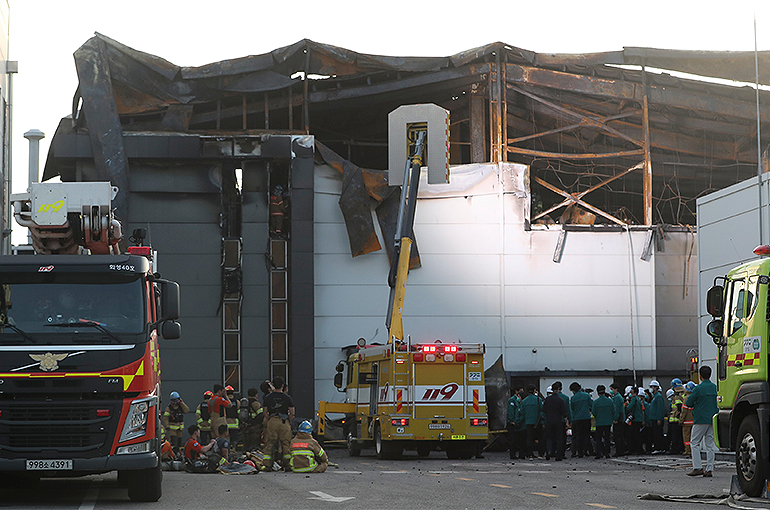 17 Chinese Workers Die in Fire at South Korean Battery Plant
17 Chinese Workers Die in Fire at South Korean Battery Plant(Yicai) June 25 -- Seventeen Chinese nationals were killed in a fire at a battery factory in Hwaseong, South Korea's Gyeonggi province, according to the latest official data.
A total of 22 workers died in the fire on June 23, of which 17 were Chinese, according to preliminary estimates, the Chinese Embassy in South Korea said in a statement today, citing South Korean authorities. Eight people were injured, including one Chinese national, who suffered minor injuries.
It took only 15 seconds from the first emission of smoke from the lithium batteries stored in the plant to the intense combustion that filled the entire workspace with smoke, according to the South Korean fire department. Fire extinguishers were unable to suppress the rapid spread of fire, China Central Television reported.
The fire probably spread too quickly, preventing the workers from escaping, said Kim Jae-ho, professor of fire and disaster prevention at Daejeon University. "Battery materials like nickel are highly flammable," he noted. "Compared to fires caused by other materials, people usually do not have enough time to react."
The factory that caught fire belongs to Aricell, a subsidiary of South Korean firm S-Connect. Founded in 2020, Aricell produces lithium batteries for sensors and radio communication equipment. According to reports, the factory has 11 buildings and 35,000 finished lithium batteries in store.
China holds a leading position in the global battery supply chain, possessing a large number of skilled industrial workers and professionals, so South Korean companies often offer high pay to Chinese workers to secure technical proficiency and rich experience, industry insiders said when asked why there are so many Chinese workers in South Korea.
Many people from the Yanbian Korean Autonomous Prefecture in China's northeastern Jilin province work in Japan and South Korea, a person living in the region told Yicai. Since Yanbian has a high concentration of Korean ethnic groups, local residents do not face language barriers when seeking employment in South Korea, the person added.
South Korea introduced 120,000 new foreign workers last year, with the figure expected to reach a record high of 165,000 this year. As of Dec. 31, South Korea had over 2.5 million foreign residents, up 12 percent from a year earlier. Among them, Chinese nationals were the largest group, with 942,000 people, accounting for nearly 38 percent of the total.
South Korea is also one of the world's leading battery manufacturing hubs. There were three South Korean firms in the top 10 by electric vehicle battery installation, according to consulting firm SNE Research. LG Energy Solution ranked third, SK On fifth, and Samsung SDI seventh. Japan's Panasonic ranked fourth, and all the others were Chinese.
Editor: Futura Costaglione